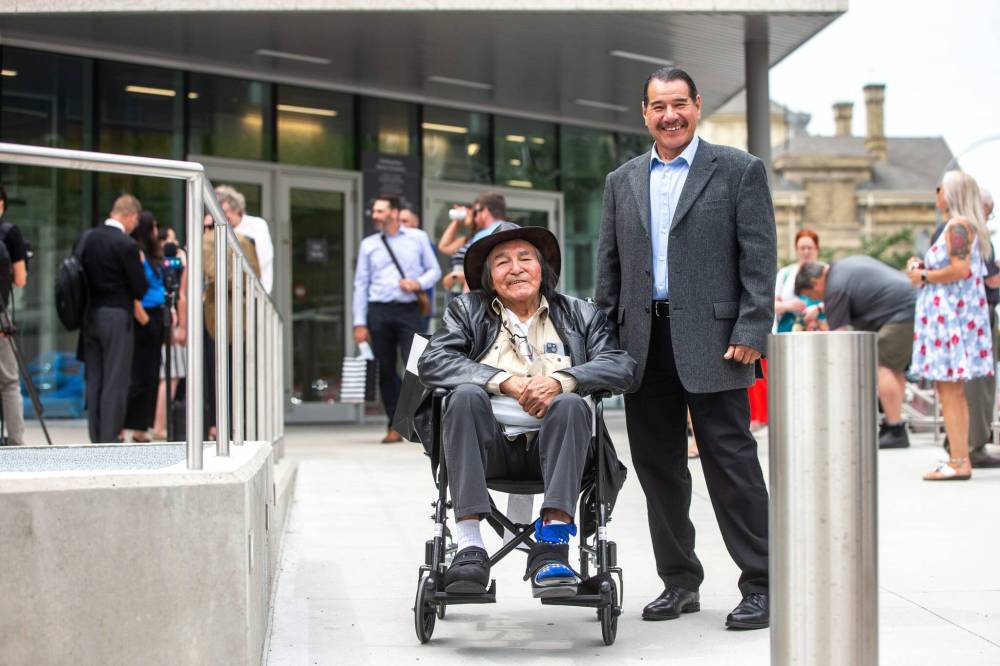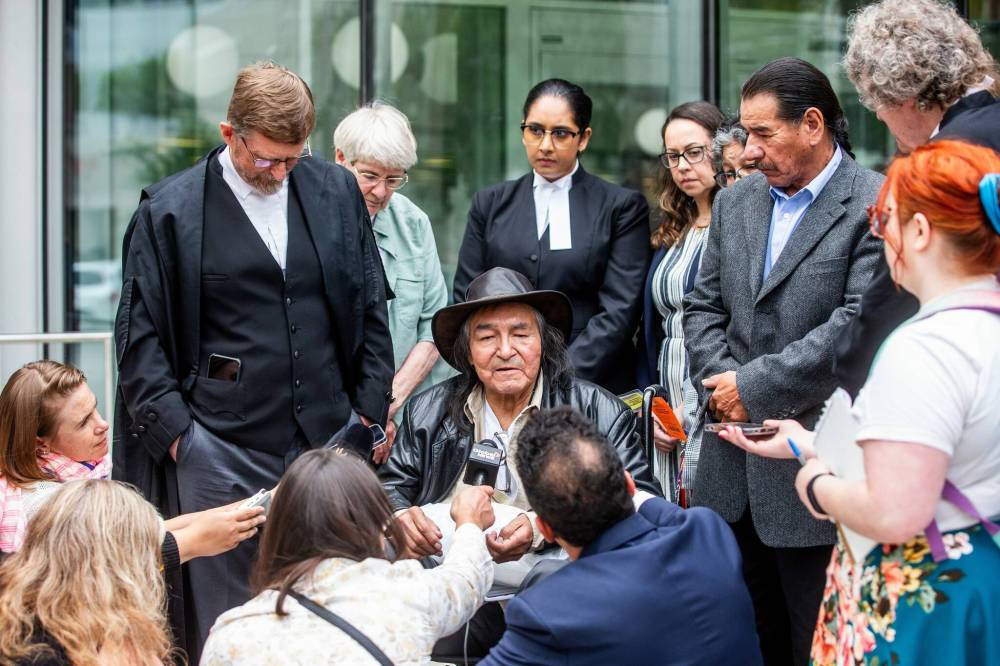Better 15 years late than never for innocent victims of corrupted prosecution
Advertisement
Read this article for free:
or
Already have an account? Log in here »
To continue reading, please subscribe:
Monthly Digital Subscription
$0 for the first 4 weeks*
- Enjoy unlimited reading on winnipegfreepress.com
- Read the E-Edition, our digital replica newspaper
- Access News Break, our award-winning app
- Play interactive puzzles
*No charge for 4 weeks then price increases to the regular rate of $19.95 plus GST every four weeks. Offer available to new and qualified returning subscribers only. Cancel any time.
Monthly Digital Subscription
$4.99/week*
- Enjoy unlimited reading on winnipegfreepress.com
- Read the E-Edition, our digital replica newspaper
- Access News Break, our award-winning app
- Play interactive puzzles
*Billed as $19.95 plus GST every four weeks. Cancel any time.
To continue reading, please subscribe:
Add Free Press access to your Brandon Sun subscription for only an additional
$1 for the first 4 weeks*
*Your next subscription payment will increase by $1.00 and you will be charged $16.99 plus GST for four weeks. After four weeks, your payment will increase to $23.99 plus GST every four weeks.
Read unlimited articles for free today:
or
Already have an account? Log in here »
Hey there, time traveller!
This article was published 18/07/2023 (904 days ago), so information in it may no longer be current.
On Tuesday, exactly 50 years and one day after Brian Anderson and Allan Woodhouse were arrested for murder, the two men returned to a Winnipeg courtroom to see if justice could finally be done.
This fact that this was happening on such an auspicious anniversary was nothing short of a triumph of fate.
Advocates for Anderson and Woodhouse had worked for nearly eight years to get to this point. Their convictions were only overturned by federal Justice Minister David Lametti on June 22. And the decision by Court of King’s Bench Chief Justice Glenn Joyal to schedule a hearing less than a month later on whether to hold a new trial was nothing short of miraculous.

MIKAELA MACKENZIE / WINNIPEG FREE PRESS
Allan Woodhouse (left) and Brian Anderson outside the Law Courts as innocent men after being wrongfully convicted of murder decades ago on Tuesday.
But there they were, standing in a court of law, a half-century after Winnipeg police arrested Anderson, Woodhouse and two other Indigenous men for the 1973 murder of Ting Fong Chan, a chef at a downtown restaurant. The charges were read out, the Crown prosecutor in attendance declined to call evidence and Joyal punctuated the day by acquitting both men and declaring them completely innocent.
Joyal’s decision was both just and justified. The case against Anderson and Woodhouse was solely based on clearly false and coerced confessions elicited by police detectives with a reputation for using violence and intimidation. The accused spoke very little English and yet had somehow provided Winnipeg police with fulsome, grammatically correct admissions of their guilt.
The acquittals and declaration of innocence were very nearly a perfect ending to this story. Except for one glaring fact: this should have happened 15 years earlier.
In February 2007, the commission of inquiry into the wrongful conviction of James Driskell recommended Manitoba Justice undertake a review of all cases handled by storied former prosecutor George Dangerfield, the Crown attorney in the Anderson and Woodhouse case and, at the time, the author of two confirmed cases of wrongful conviction.
Then-Manitoba justice minister Dave Chomiak pledged to conduct such a review of “similar cases prosecuted by George Dangerfield where a claim of wrongful conviction is made.” And to demonstrate his commitment, Chomiak hired former Ontario Superior Court Judge Roger Salhany to look at Dangerfield’s other cases.
That really should have been the moment that Anderson and Woodhouse — who have never stopped proclaiming their innocence — got a sober and unbiased re-examination of their case. Unfortunately, within a few months, Manitoba Justice officials had shut Salhany down.
When the review produced no results, Salhany publicly complained justice officials had limited the scope of his mandate. Although Chomiak promised to look at all “similar” cases, prosecutors insisted Salhany could only look at those involving non-disclosure.
Why this was done was never fully explained.
Dangerfield’s wrongful convictions did indeed involve non-disclosure. But they also featured jailhouse informants, secret compensation deals with unsavoury witnesses, unreliable evidence based on junk science and coerced confessions.
Dangerfield’s wrongful convictions almost always featured a complex web of corruption.
Police would coerce a confession or fabricate evidence but not officially tell Dangerfield, leaving him free to introduce them at trial. Senior Crown attorneys would negotiate compensation for prosecution witnesses, but not officially tell Dangerfield so he could have the witnesses claim they received nothing in exchange for their testimony.
At best, this was a methodology for trying a crime that featured deliberate, willful blindness. At worse, it was a carefully constructed conspiracy of winks and nods designed to fit just about any person to any crime.
But here’s the real irony of this most recent wrongful conviction: the Anderson and Woodhouse case actually did fit within the contrived mandate of the Salhany review, as it involved significant non-disclosure.

MIKAELA MACKENZIE / WINNIPEG FREE PRESS
Allan Woodhouse speaks with the media outside of the Law Courts after being declared innocent on Tuesday.
An investigation conducted by the federal Justice Department using powers granted to Ottawa under the Criminal Code found that Dangerfield had failed to disclose “police reports that would have impacted the testimony of Crown witnesses, undermined the Crown’s case and assisted the defence. They also include police reports of other, cogent, non-Indigenous suspects in Mr. Chan’s murder. Once again, Mr. Dangerfield had undermined a fair trial by withholding key disclosure.”
With all this non-disclosure, how could Salhany have missed this case back in 2007? This is where the strategy employed by Manitoba Justice comes into full view.
Turns out that Salhany’s mandate was actually a scam to keep Dangerfield’s cases from outside scrutiny.
Think about it. How can you identify cases where there has been non-disclosure when, by it’s very nature, non-disclosure is something that has been deliberately hidden from plain view.
Non-disclosure has to be unearthed through meticulous and comprehensive re-investigation of a case. It means hours upon hours of digging into case files and police statements to look for the weak links in the prosecution.
By denying Salhany an opportunity to examine all of Dangerfield’s cases in detail, Manitoba Justice was ensuring that other cases — even those involving non-disclosure — would never be uncovered.
In perverting the Salhany review, Manitoba Justice revealed two alarming truths.
First, that justice officials learned nothing from the embarrassment of George Dangerfield’s wrongful convictions.
And second, that they were just as willing as Dangerfield to cheat the system to keep other wrongful convictions from seeing the light of day.
dan.lett@winnipegfreepress.com

Dan Lett is a columnist for the Free Press, providing opinion and commentary on politics in Winnipeg and beyond. Born and raised in Toronto, Dan joined the Free Press in 1986. Read more about Dan.
Dan’s columns are built on facts and reactions, but offer his personal views through arguments and analysis. The Free Press’ editing team reviews Dan’s columns before they are posted online or published in print — part of the our tradition, since 1872, of producing reliable independent journalism. Read more about Free Press’s history and mandate, and learn how our newsroom operates.
Our newsroom depends on a growing audience of readers to power our journalism. If you are not a paid reader, please consider becoming a subscriber.
Our newsroom depends on its audience of readers to power our journalism. Thank you for your support.
History
Updated on Wednesday, July 19, 2023 9:00 AM CDT: Minor copy editing change






